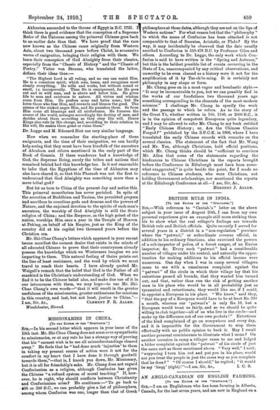BRITISH RULE IN INDIA.
[To THE EDITOR OT THE " SPECTATOR."] SIR,—With reference to " Cantab.'s " letter on the above subject in your issue of August 20th, I can from my own
personal experience give an example still more striking than
his to show what the real villager's feelings are towards British rule and British officials. Quite recently I served for
several years in a district in a " non-regulation " province where the " patwari," or subordinate revenue official, in addition to his ordinary functions, also exercised the powers of a sub-inspector of police, of a forest ranger, of an Excise inspector,' &c. Every such " patwari " had a considerable number of villages under his control, and naturally the oppor- tunities for making additions to his official income were numerous. One day when I was in camp several villagers came to me with a unanimous complaint against the " patwari " of the circle in which their village lay that his extortions passed all bounds, that they wanted him turned out, and that, rather than run the risk of getting another man in his place who would be in all probability just as tyrannical and extortionate, they would like me, if I could, to appoint a European in his place. "We know," said they, " that the pay of a European would have to be at least Rs. 200 a month, whereas our patwari's ' is only Rs. 10, but a European would treat us fairly, and so we should be quite willing to club together—all of us who live in the circle—and make up the difference out of our own pockets !" Extortions of the kind complained of go on everywhere and every day, and it is impossible for the Government to stop them effectually with no public opinion to back it. May I recall another personal reminiscence to illustrate what I mean ? On another occasion in camp a villager came to me and lodged a bitter complaint against the " patwari " of his circle of just the same sort as those mentioned above. " Very well," I said ; " supposing I turn him out and put you in his place, would not you treat the people in just the same way as you complain that he does ? " "Of course I should," he replied; "it would be my haqq ' (right) ! "—I am, Sir, &c., L C. S.










































 Previous page
Previous page